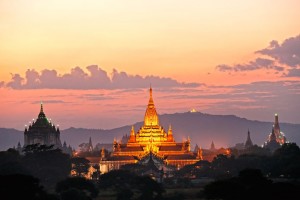Rules Are for Schmucks: Why the Free Pass for Buddhism?
 Buddhist temples in Myanmar. Photo by masterlu / 123RF
Buddhist temples in Myanmar. Photo by masterlu / 123RF “Buddhism is not a religion.” Have you heard that one before? I certainly have, many times. Like here, and here, and here.
OK, so if Buddhism is not a religion, then why is the government of Myanmar hard at work on a new law prohibiting its citizens from converting from the Buddhist religion to some other religion, without first getting official permission from government bureaucrats? Strange as it sounds, that’s exactly what it’s doing. It seems that too many Buddhist women are choosing to marry Muslim men, which (according to the strict rules of Islam) means they have to become Muslim themselves. Next thing you know, out pop little Muslim offspring, who are generally unwilling to support Myanmar’s vast Buddhist clergy in the lifestyle to which it has become accustomed.
Plan A for dealing with this troublesome trend was the time-honored ritual of head-bashing. In the past two years, nearly 300 have been killed and 140,000 left homeless in Myanmar’s religious violence, nearly all of them Muslim. Some of the violence resulted from Buddhist monk demands for a boycott against all Muslim-owned businesses. That’s untidy, though, so Plan B is now on the table. The anti-conversion law has been pushed by a Buddhist monk group called the “Organization for the Protection of Race and Religion,” which collected over 1.3 million petition signatures for the bill, and endorsed by Myanmar’s president Thein Sein.
If Buddhism is not a religion, then what are they protecting?
[Don’t give Myanmar’s Buddhists credit for coming up with this idea, though. India’s Orissa province already requires police permission for anyone wishing to switch religions.]
Then there’s Sri Lanka, where the Buddhist-dominated government just created a new religious police unit, a decision warmly welcomed by the head of the Buddhist clergy organization Bodu Bala Sena: “This is a Sinhala Buddhist country and the decisions should be taken according to Sinhala Buddhists.” He’s certainly right about Sri Lanka being a Buddhist country – establishing Buddhist supremacy is what fueled the bitter war against the minority Tamils (largely Hindu, Christian and Muslim) that took from 80-100,000 lives before it finally ended in 2009. Sri Lanka’s Buddhist government flatly refuses to cooperate with a United Nations investigation into war crimes, evidenced by actual video footage of Tamil prisoners being stripped naked and shot.
Then there’s America’s darling, the Dalai Lama. When he visited Washington in March, he was picketed – by fellow Buddhists, angry at his crackdown on a particular brand of Buddhist religious heresy. This ban denied the heretics access to doctors, restaurants, and other facilities under control of the Dalai Lama’s faction. Sure sounds like religion at work to me.
And let’s not forget Buddhist magic – all the money pouring into Buddhist coffers from the display of objects purporting to be the congealed souls of cremated Buddhist saints (which bear a striking resemblance to gallstones), or the tooth of the Buddha himself (which dental experts say is more likely the tooth of a cow). Just what is it that is non-religious about all this?
Buddhism has a variety of sub-sects and flavors, just like Christianity, Islam, and Judaism do. In each case, some factions are more heavily weighted toward reason-based philosophy, and others are more heavily weighted toward hokum. That doesn’t mean that Buddhism is not a religion, though, any more than it means Reform Judaism or Unitarianism are not religions. My definition of “religion,” which I proudly believe covers all the bases, is that religion is whatever the recipients of government religious handouts say it is – no more, and no less.
